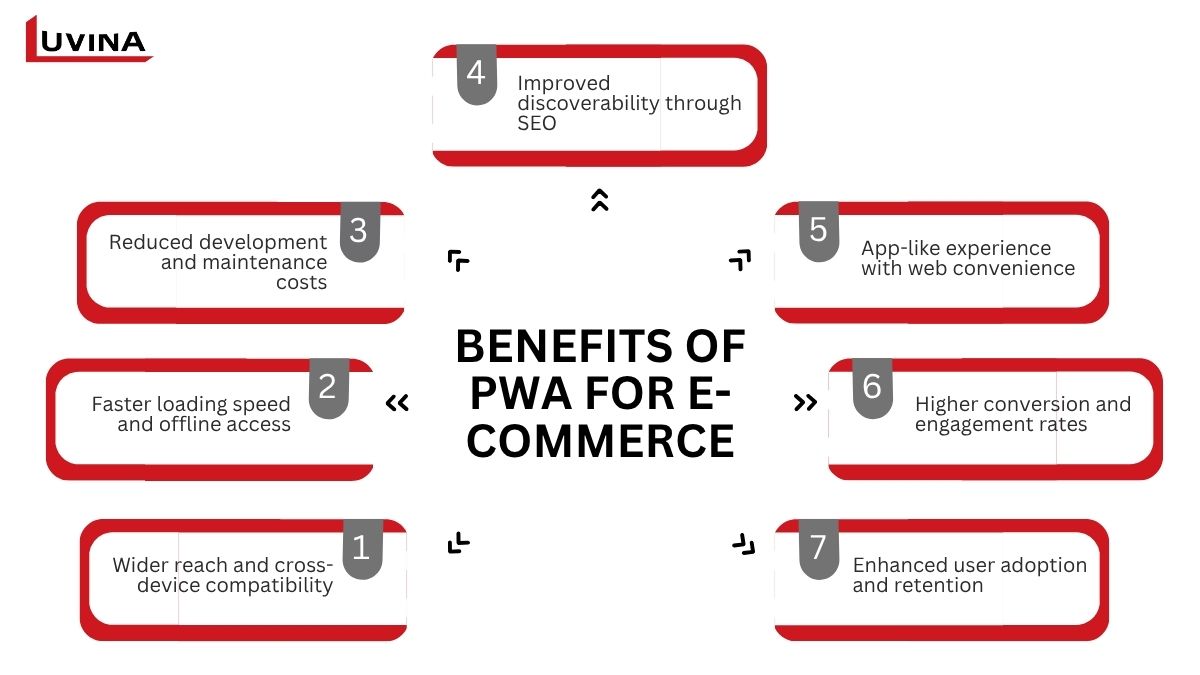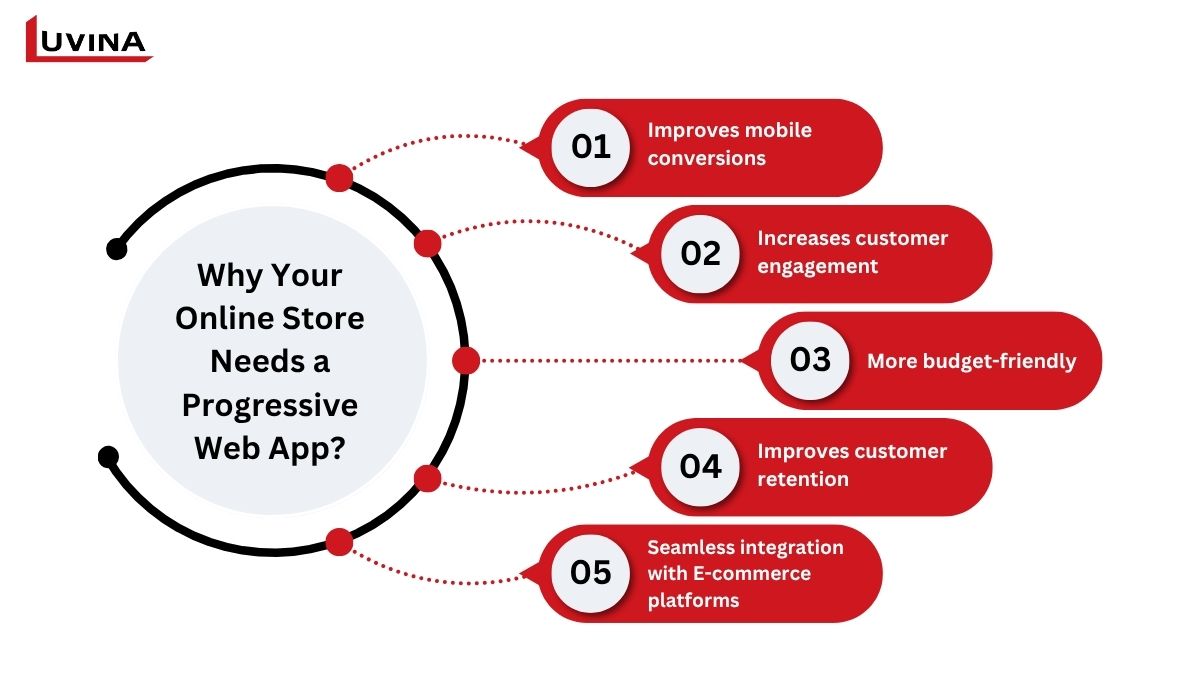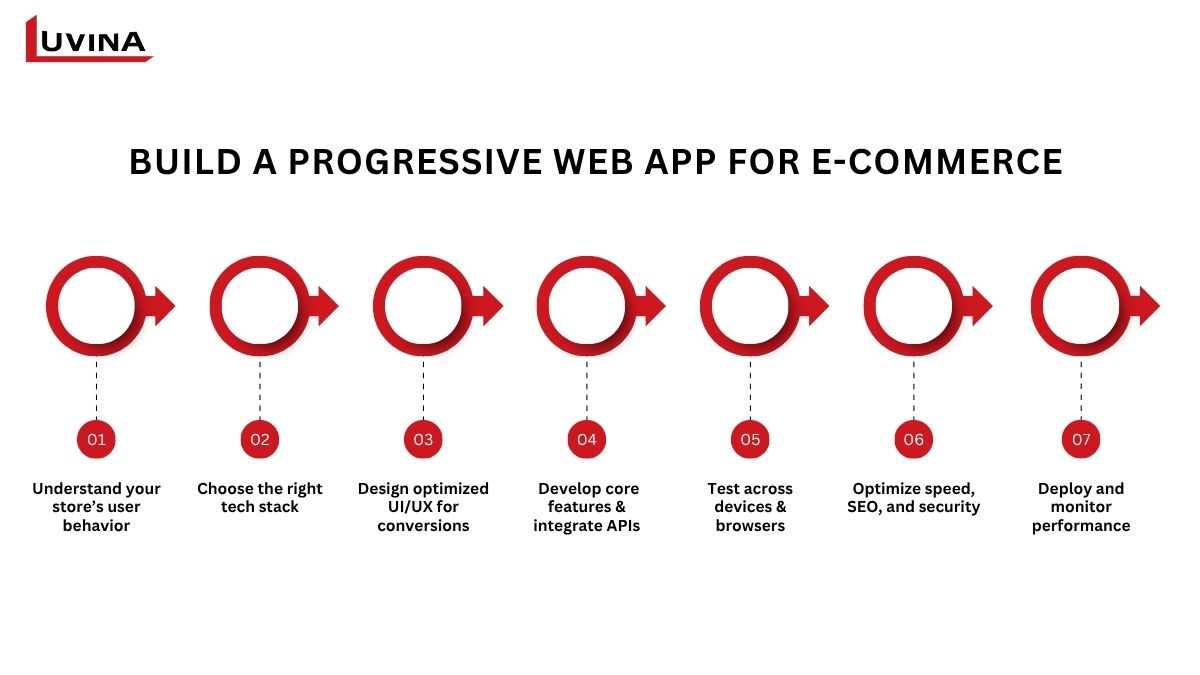As mobile commerce continues to dominate, online retailers face mounting pressure to deliver faster, more reliable, and app-like shopping experiences. And progressive web app development for e-commerce is the solution.
Small and medium-sized companies may gain just as much from PWAs as giants like AliExpress and Twitter have already used them to increase user retention and conversions. This essay will examine how PWAs operate, why they are more crucial now than ever, and how your e-commerce company can open up new revenue channels using this potent technology.
What is a Progressive Web App (PWA) e-commerce?
A Progressive Web App (PWA) is a type of website that looks and feels like a mobile app but runs directly in your browser, no need to install anything. For e-commerce, this means shoppers can enjoy fast, reliable, and app-like experiences while businesses save time and cost on development.
46% of developers see PWAs as the direction of app development (compared to only 14% favoring native apps); therefore, it’s evident that this technology is getting great traction. PWAs provide ecommerce companies a flexible route to better performance, consumer engagement, and conversion rates, whether used to support or replace a conventional mobile app. This growing preference suggests that even non-technical e-commerce owners should consider PWAs as a future-ready solution that doesn’t require maintaining separate mobile apps.
Benefits of PWA for e-commerce
For companies, progressive web app development for e-commerce offers a fast, smooth, and affordable choice. These are the main advantages that make PWAs a good option for online merchants:

- Wider reach and cross-device compatibility
PWAs work on any device, whether your customers use an iPhone, Android, or desktop. That means you don’t need separate apps for different platforms, and your customers get a consistent shopping experience everywhere.
- Faster loading speed and offline access
Advanced caching and service workers enable PWAs to load pages at lightning speed, even when there is poor connectivity or offline. Particularly in areas with erratic internet access, this lowers bounce rates and boosts consumer involvement.
- Reduced development and maintenance costs
PWAs operate on one code base, hence greatly lowering development time and expenses as well as streamlining ongoing maintenance. Companies may release updates immediately without needing to go through approval procedures in the app stores.
- Improved discoverability through SEO
Since PWAs are search engine-friendly, your online store can appear more easily on Google. Each product page can be indexed just like a normal website, helping new customers find you without extra ad spending.
- App-like experience with web convenience
PWAs provide the best of two worlds: the ease and accessibility of a website with the rich interactivity and fluent navigation of a native application. Users like immediate transitions, gesture support, and a polished user interface free from downloads.
- Higher conversion and engagement rates
With quicker loading times, fluid browsing, and offline capability, PWAs remove friction in the purchasing path, hence improving business results naturally through a better user experience. Actual cases, such as Alibaba’s 76% rise in conversions, highlight the obvious influence PWAs may create.
- Enhanced user adoption and retention
By removing the need to download apps from a store, PWAs reduce the entry hurdle. Users may rapidly return using saved links or home screen icons, and companies gain from more frequent repeat visits and increased brand recall.
Key features of PWAs
Progressive web app development for e-commerce helps businesses deliver app-like experiences directly through the browser without installation or storage burdens. The table below outlines the core features that make PWAs ideal for modern online stores:
| No. | Feature | Description |
| 1 | HTTPS security | Ensures secure data transmission and protects user information using HTTPS encryption. |
| 2 | Instant page loads | Speeds up navigation with cached content, removing white screen delays. |
| 3 | Offline functionality | Allows access to preloaded pages even without an internet connection. E.g., the customer can browse saved items even without Wi-Fi. |
| 4 | Push notifications | Sends real-time messages to re-engage users, even when the browser is closed, with higher open rates than email.E.g., Send a reminder when a customer leaves items in their cart. |
| 5 | Payment request API | Simplifies and secures the checkout process directly within the browser, eliminating complex forms. |
| 6 | Add to homescreen | Let’s users pin the PWA to their device’s home screen, offering native app-like convenience and visibility. |
Why Your Online Store Needs a Progressive Web App?
As e-commerce continues to shift more online, having a mobile strategy is a necessity. Progressive web app development for e-commerce will greatly enhance the user experience and alter business performance for online retailers. Here are the main reasons to illustrate why progressive web app development for online stores is so important to the success of your e-commerce business:

- Significantly improves mobile conversions: Mobile users are becoming much more comfortable purchasing online on a mobile device, and mobile conversion rates continue to grow. Progressive web apps provide a fluid, fast, and easy shopping experience that allows for little friction between users and their conclusive transaction completion.
- Increases customer engagement with push notifications: Progressive web apps allow a business to send targeted push notifications to customers on their mobile devices even when they’re not browsing, allowing you to send customers reminders about abandoned carts or updates about new products and promotions, meaning they will visit frequently until converting.
- Design and maintain a more budget-friendly app than a native app: The typical cost and speed to develop and maintain a native app can sometimes be costly on both ends. With progressive web app development costs, they offer a more convenient design that budget-wise gives you the entire business a single app codebase to use across platforms, making designing faster and continuing to be less affordable moving forward, while experiencing serious and significant growth.
- Improves customer retention through a fast, app-like experience: PWAs maintain near-instant page loads (even on slow networks) through precaching and proper loading, and enhance website performance to deliver a fast and reliable experience to keep visitors engaged longer, versus regular websites, lowering bounce rates, and improving search engine ranking.
- Seamless integration with well-known E-commerce platforms: PWAs can easily integrate with famous e-commerce platforms like Shopify, WooCommerce, and Magento, allowing online businesses to take advantage of their existing infrastructures while upgrading their mobile experience and overall experience.
Must-Have Features in a PWA for Online Stores
Investing in progressive web app development for e-commerce requires the integration of elements that improve user experience, simplify purchasing, and maximize business potential. Every PWA for internet retailers should possess the following main attributes:
| No. | Feature | Description |
| 1 | Mobile-first responsive design | Ensures the app adapts seamlessly to all screen sizes, providing an optimal experience on smartphones and tablets before desktops. |
| 2 | Fast product browsing & smart search | Enables users to quickly find products through intuitive navigation and intelligent search functions. |
| 3 | Cart, checkout, and payment support | Supports smooth and secure shopping cart management, easy checkout processes, and multiple payment options. |
| 4 | Secure login/account management | Protects user data with encrypted login and secure account features. |
| 5 | Integration with order tracking & inventory | Keeps customers updated on order status and product availability by syncing real-time inventory and tracking systems. |
| 6 | Push notifications | Engages customers by sending timely updates about promotions, discounts, new arrivals, and other relevant information. |
| 7 | Multilingual and multi-currency support | Allows users from different regions to browse and shop comfortably with language options and currency conversions. |
| 8 | SEO optimization | Incorporates structured data, fast loading times, and mobile-first design to improve search engine rankings and increase organic traffic. |
How to Build a Progressive Web App for E-commerce
To effectively execute your progressive web app development for an e-commerce site, you need a straightforward, step-by-step method. First things first, here are the steps necessary to develop and deploy a good PWA for your e-commerce website.

Step 1: Understand your store’s user behavior
It is critical to have a thorough grasp of your clients’ needs and behavior before starting progressive web app development for online stores. Begin by determining who your main users are, the kind of network circumstances they encounter, if they mostly buy on mobile devices, and what characteristics they expect from your app.
Next, define the core purpose of your PWA. Are you after a simple app with fast loading, offline access, and basic browsing? Or are you looking for a more optimized solution through interactive and push notifications, and personalization for user recommendations? Early definition of these goals helps you to customize your development process and give first priority to the appropriate features that provide actual value to your consumers.
Step 2: Choose the right tech stack
Choosing the correct technology becomes an important step in progressive web app development in the e-commerce sector. To help select the technology stack appropriately, begin with the development requirements – know your project’s requirements, including its features, expected traffic, and the integration with systems such as CMS/Catalog, and Payment gateways.
The choices of technology can be broad, and for the front-end build, some of the most commonly used frameworks are React, Angular, and Vue.js. On the backend, Node.js is a common choice, in part for its scalable and fast capabilities. With your possible current stack, you may also consider other alternatives such as PHP (Laravel) or Python (Django/Flask). You don’t need to pick the tools yourself, but it’s important to know that modern frameworks like React or Vue.js help build faster and more interactive storefronts and Node.js for a scalable back-end system. Your development partner will recommend the best fit based on your business size and existing systems.
To provide an excellent user experience with your PWA, consider incorporating some testing or performance tracking tools like Lighthouse and Google Analytics.
Step 3: Design optimized UI/UX for conversions
Make sure the design is simple and mobile-friendly. Buttons should be easy to tap, images load quickly, and checkout is smooth. This keeps shoppers from getting frustrated and helps them complete purchases faster.
Some important features are: easy to find and click call-to-action buttons, simple layouts, fast-loading images to reduce shopping friction, easy search and filter capabilities, and smooth checkout processes to improve user experience. You could also use the shopping experience to engage with your customers by including product recommendations and offers tailored to each user, which would improve engagement, possibly conversions.
Step 4: Develop core features & integrate APIs
It’s time to think about the features you will offer your users in this phase of progressive web app development for e-commerce to create a flawless shopping experience. Fast product browsing, safe user authentication, shopping cart functionality, and checkout with multiple payment options are usually included in these essential features.
One equally important trait of web-apps is to also integrate the app with third-party services, APIs, inventory systems, and other services that you can use. Doing these integrations also makes sure that your app’s data is real-time, reducing possible errors in daily operations.
Finally, ensure you also build an offline mode and the ability for push notifications in order to keep customer engagement levels high even when customers are not actively using the app.
Step 5: Test across devices & browsers
When you’re creating your progressive web app development for online stores, it is essential to verify that proper/mobile web testing has been done to ensure enhanced customer experiences throughout. Start by testing the PWA on major browsers (Chrome, Safari, Firefox, etc.) and multiple devices (smartphone, tablet, and desktop).
Also, test offline behavior and slow/unstable network conditions. Verify cached content loads and that no critical functionality requires an active Internet connection.
Step 6: Optimize speed, SEO, and security
For your e-commerce app to be most effective, it helps to optimize your app for speed, search engines, and security. Use tools like Google Lighthouse to do detailed audits that check your app’s performance, accessibility, and SEO.
Minimize any issues that contribute to slow load times or negatively influence the user experience – by minifying code, compressing assets, and caching resources – and optimize your app to comply with security standards (e.g., HTTPS and secure authentication practices) – to protect your user data and develop customer credibility and trust.
Step 7: Deploy and monitor performance
In the process of progressive web app development for e-commerce, once testing is complete, you will be ready to deploy your PWA in the context of an HTTPS (secure) environment to securely safeguard user data and allow for immediate access by users. Usually, PWAs have an advantage over native applications because PWAs are delivered via web app manifests, which can be navigated directly via a web browser, meaning that deploying them is easier (but equally as essential).
Once the app is “live”, it needs to be closely monitored to ensure you are achieving optimal performance and delivering a superb user experience on all devices. Use analytics applications like Google Analytics for e-commerce by tracking user behavior and engagement, which will generate unique insights for you to improve your PWA based on comprehensible user data and engagement behaviors.
Build Lightning-Fast E-commerce PWAs with Luvina
In the world of progressive web app development for e-commerce, the execution of a fast, cohesive, and exciting shopping experience is critical to the success of the business. Luvina applies leading-edge PWA technology to assist eCommerce companies in converting hurdles like slow loading times, high bounce rates, and broken user journeys into opportunities without compromising their customers’ needs. One of our clients, a premium flower brand, reduced page load time by 60% and saw mobile orders increase by 35% after switching to a PWA developed by Luvina.

- Cross-industry expertise: Over 20 years of experience across multiple industries to help ensure we are in tune with your business needs.
- User-focused design ethos: We always put the user first, developing PWAs that aren’t just functional but also provide excellent user experiences.
- Speed and efficiency: The focus isn’t only on load times, offline capabilities, and engagement options such as push notifications, but also on optimizing engagement and conversion.
- Tailored development strategy: No cookie-cutter products, every PWA is tailored specifically to your unique business goals and customer requirements.
- Demonstrated success: Successfully delivered hundreds of projects with measurable results in reducing load times and increasing user retention.
- Full-service partnership: End-to-end service from strategy and design to development and deployment, ensuring a smooth and efficient process.
Partner with Luvina to transform your e-commerce platform with a lightning-fast progressive web app designed to meet the unique needs of your business and customers.e, and backend frameworks such as Node.js, .NET, and Firebase are used for custom mobile development.
>> Read more: How To Build Your Own AI eCommerce Chatbots









Read More From Us?
Sign up for our newsletter
Read More From Us?
Sign up for our newsletter